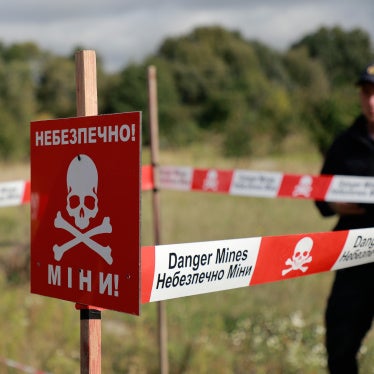President Barack Obama
The White House
CC: Secretary of Defense Chuck Hagel
CC: Secretary of State John Kerry
CC: National Security Advisor Susan Rice
Dear President Obama:
We are writing to urge you to promptly conclude the policy review on banning antipersonnel landmines so that the United States can announce the results by the Third Review Conference of the 1997 Mine Ban Treaty, which opens in Maputo, Mozambique on June 23, 2014.
More than 100 governments are expected to attend the Maputo Review Conference, which marks an important opportunity for mine-affected Mozambique to showcase the tremendous progress it has made in mine clearance since hosting the First Meeting of States Parties to the Mine Ban Treaty in May 1999.
Since the treaty entered into force on March 1, 1999, and with the assistance of the US and other donor nations, large tracts of land around the world have been cleared of mines and returned to productive use. The number of civilians killed and wounded by mines each year has fallen dramatically. More than 47 million antipersonnel mines have been destroyed from stockpiles and use of the weapon even by those not party to the treaty is rare.
The US has played an important role in funding mine action projects around the world yet this financial support to eradicate landmines in the ground should be matched by a political commitment to tackle the weapons over the long-term by ensuring that no more mines are used.
We again urge that the policy review conclude with a decision to join the Mine Ban Treaty as soon as possible, to prohibit the use of antipersonnel mines immediately, and to begin destruction of all stocks of antipersonnel mines. US accession would help to convince the other countries not yet party to join, strengthening the norm against the weapon, and thereby helping to ensure that it is not used in the future.
We understand that there are two concerns regarding Korea that may be sticking points in the policy review. One is the arrangement for a joint command structure that would put a US general in charge of South Korean military forces in the event of active hostilities, and the potential problems that might cause if the US was party to the Mine Ban Treaty but South Korea was not. However, several years ago a decision was taken to put South Koreans in charge of their own forces during wartime, and while implementation of that decision has been delayed several times, the future command structure has been agreed and should not be an obstacle to the US joining the Mine Ban Treaty.
The second concern is the possible need for the US to use antipersonnel mines in the event of an invasion by North Korea. As a result of the 2004 policy decision by President George W. Bush, the US has already prohibited the use by its forces in Korea and throughout the world of the most common types of antipersonnel mines, those that are buried in the ground (“dumb” or “persistent” antipersonnel landmines that lack a self-destruct feature). The landmines already laid in and near the Demilitarized Zone between North and South Korea are the responsibility of South Korean forces and not the US.
But some maintain that the US may need to use so-called smart landmines in Korea. These are remotely delivered mines, scattered over wide areas by aircraft, artillery, or rockets, and equipped with a self-destruct feature designed to blow the mine up after a pre-set period of time. However, numerous retired military officers have questioned the utility of both smart and dumb antipersonnel landmines in South Korea, citing the overwhelming technological superiority of other weapons in the US-South Korean arsenal in comparison to North Korea as sufficient to compensate for not using mines. In addition, a former commander of US forces in Korea, Lt. General James Hollingsworth, said in 1997 that antipersonnel landmines’ “minimal” utility to US forces is “offset by the difficulty …[they] pose to our brand of mobile warfare… Not only civilians, but US armed forces, will benefit from a ban on landmines. U.S. forces in Korea are no exception.”
We understand that some in the US military want to retain the option to use “smart” mines not just in Korea, but also elsewhere. During the 1997 negotiations of the Mine Ban Treaty, the US sought unsuccessfully to exempt self-destructing mines from the ban, but was rebuffed by its closet military allies, including Australia, France, Germany, Japan, and the United Kingdom, which concluded that the humanitarian dangers of such mines outweighed any military utility.
Nonetheless the US has not used antipersonnel landmines—“smart” or “dumb” ones—since the first Gulf War in 1991. It has not exported antipersonnel mines since 1992 and has not produced them since 1997. This record shows that the US military already has alternative weapons to use in place of antipersonnel mines. The US military has refrained from using antipersonnel landmines in part because the broadly ratified Mine Ban Treaty has stigmatized these weapons, but that reality is not likely to change.
Over the past 20 years, the US has fought a wide range of conflicts, both high and low intensity in a variety of environments, and has demonstrated that it can employ alternative strategies, tactics, and weaponry without having to resort to antipersonnel mines. It has also spent more than one billion dollars on the development and production of systems that could be considered alternatives to antipersonnel mines.
Now is the time to ban these inhumane weapons that are no longer essential to US security or the security of US allies. Now is the time to join the Mine Ban Treaty.
Sincerely,
Kenneth Roth
Executive Director








